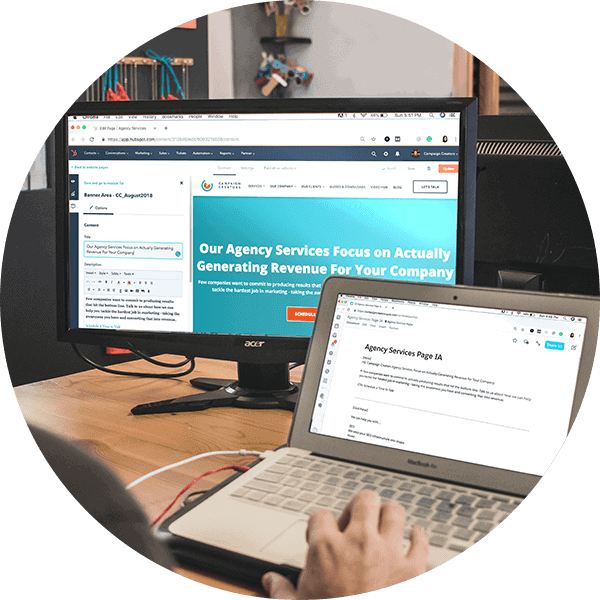
Four Services that Make a Great Web Design Agency
November 4, 2022
AI-Ready Business: 5 Steps for Success in the AI Economy
July 13, 2023Artificial Intelligence (AI) has always followed a boom-bust cycle of development, but every boom seems to get bigger and every bust is a little smaller. AI is rapidly changing the way we conduct business, even if the hype is, at times, a little over the top. Today, even the smallest businesses are adopting AI to enhance efficiency and productivity, but they’re not always accounting for the risks associated with technologies like ChatGPT, Midjourney, or Bard. To leverage AI’s potential while attending to AI risk management, businesses of all sizes must establish clear AI usage policies.
Why Should Your Business Care about AI Risk Management?
You might think that a small business using AI on a smaller scale may not need to be worried about AI risk management. However, this presumption couldn’t be further from the truth. Even for a small business, adopting AI tools means navigating complex issues around data privacy, transparency, human oversight, accountability, and intellectual property rights. These issues apply regardless of the scale of AI usage. By incorporating AI consulting services and adopting a foundational AI usage policy, small businesses can ensure responsible AI use, protect themselves legally, and instill confidence among their employees and customers.
Here are five foundational rules that every business, regardless of its size, should consider adopting as part of their AI usage policy:
1. Discretion in AI Interactions
Always be mindful of the information you and your employees share. Treat interactions with AI tools the same way you would handle communications with external parties. Avoid disclosing sensitive or proprietary information as AI tools may not provide the level of privacy protection you assume.
Most businesses already have policies in place that dictate what information can or should be shared with people outside the company. These boundaries should be easy for your employees to understand, and including “AI Tools” in this category shouldn’t require additional clarifications or training – making this policy the quickest to implement.
2. Transparency in AI Usage
Be open about when and how you’re using AI. As you add more AI tools to your tech stack, update your policies and keep your team and clients in the loop. This transparency fosters trust and confidence, both internally and externally.
As the capabilities of generative AI tools advance, it’s going to become much more difficult to discern human-generated content from AI-generated content. Customers have a vested interest in understanding how the companies they’re working with are using these tools. For example, we still want our clients to know that a real person is dealing with their customer support requests. The form your disclosure policy will take largely depends on the nature of your business, but we believe that the default position should be to disclose all AI usage that isn’t strictly internal-use-only.
3. Human Oversight of AI Tools
AI should never operate completely autonomously. Just like you would review and verify the work of an unfamiliar contractor, you should always scrutinize the work produced by AI before incorporating it into any final deliverable.
The purpose of human oversight is not to keep AI in check, as if it could run away from you. Rather, business owners need to recognize that AI models like ChatGPT are extremely prone to errors, especially when using AI for SEO. Human oversight is a safeguard against diminishing quality in your business’ final product; Hence, it should be a non-negotiable element in your AI risk management strategy.
4. Accountability for AI Output
Whoever uses AI in your business should be responsible for the output it produces. This fosters a sense of responsibility and ensures a high standard of work. Remember, the reputation of your business is reflected in the work you deliver, including work created with the assistance of AI.
Your policy should reflect that your employees will be held responsible for any work done by their AI tools – just as if they had produced it themselves. If, for example, a mistake in a ChatGPT output resulted in damages to a client’s business, the employee who prompted the output would be held liable for those damages.
5. Authorship and AI-Generated Content
Recognize that AI-generated content does not grant ownership to the person who prompted it. If your deliverable requires clear authorship or ownership, avoid using AI to create any part of the final product.
The Copyright Office of the US maintains that AI-produced work is not owned by anyone and may not be copyrighted. Generally you hold a commercial licence for work produced by AI under your direction, but that license is (generally) not exclusive, and it does not mean that you own the work.
By adopting these five foundational rules, businesses can navigate the complexities of AI risk management more confidently and responsibly.
However, neglecting to provide clear guidance around AI usage in the workplace can lead to significant consequences, even for small businesses:
- Legal Issues: Without clear policies, companies might unintentionally violate data privacy laws or intellectual property rights, leading to legal troubles.
- Reputation Damage: If AI tools are used irresponsibly or without transparency, it can lead to a loss of trust among customers or clients, damaging the company’s reputation.
- Reduced Effectiveness: Without guidelines for how and when to use AI tools, employees might use them ineffectively or inappropriately, wasting resources and reducing productivity.
AI Risk Management Is for Everyone
AI usage policies are not just for large corporations; they are a necessity for any AI-ready business all sizes. Your policy should be as robust as your business’ exposure to these tools, and it should be your goal to provide a roadmap for responsible and effective AI use, mitigating potential risks and fostering a culture of trust and accountability. No matter the size of your business, if you’re using AI in any capacity, it’s time to think about a clear and concise AI usage policy.








